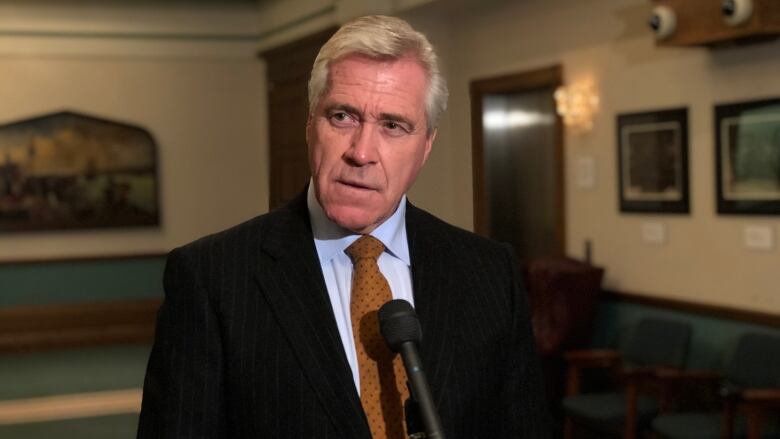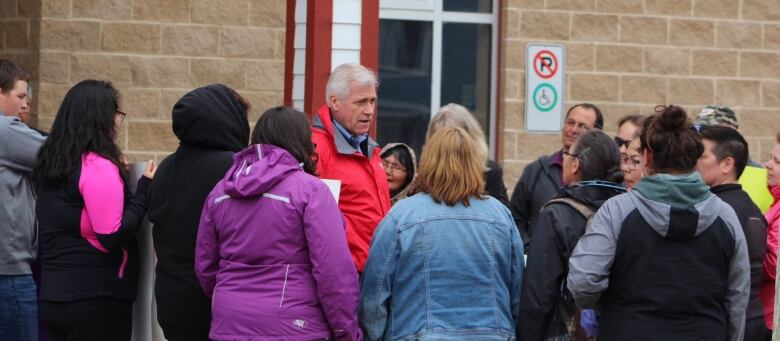As his time as premier nears the end, Dwight Ball looks back on Labrador role
Ball talks achievements, lessons learned

When the current premier of Newfoundland and Labrador stepped into his leadership role, he also took the reins for the Big Land in particular as head of Labrador affairs.
In an exit interview this week with CBC's Janice Goudie, he talked about achievements, lessons learned, and passing the torch.
The interview has been edited for length and clarity.
The provincial government recently created a $250 pandemic relief fund for nine Labrador communities. How did that come about?
When you think about what's been happening during the pandemic in some communities like the isolated communities within Labrador they've experienced some very difficult challenges. You look at, as an example, fuel costs. Those nine isolated communities, they've been on fixed costs for quite some time, just simply around the supply and demand for gasoline and oil. We felt it was appropriate to demonstrate to the people of those communities that we recognize they've had to face some financial hardships. Not like other communities; they were very different, and in this particular case we felt the appropriate thing would be for us to support them.
This is a one-time $250 grant per household. What makes a household eligible?
Well, there's a number of criteria that's in there. It's really about the extra financial costs related to the individuals that live within this group. I just mentioned one example about access to fuel and oil, gasoline and so on. That's an example that I would use [another is] the increase in food costs through this pandemic. We find that in many cases there was not all the variety of foods. We find this in normal times, so I think during this pandemic time that was even a little more exaggerated than it was before.
But it was an example for us as a province and as a government to recognize that we do see where those households would have experienced some additional costs during the pandemic. And this was just a way to give back and support those households.
I understand there's a little over 1,200 households that are eligible for the grant. Are there many more that have been omitted?
This is the only grant of this kind that we've put in place. It seems to be the sufficient amount there. We set aside well over $300,000 to deal with this one specific issue. We worked with the communities in advance of this, doing the analysis, where people are. So it seems the correct appropriation has been put in place. If we're a little short or a little over, well, we'll deal with that. But the main thing here is to identify those households that have been impacted, and the best way to do that is to work with those communities. And that's exactly what we're doing today.

You've recently announced Michelle Watkins as the new deputy minister of the Labrador Affairs Secretariat. What role is it that she's going to play, and why did you feel she was the best candidate for the position?
This was a position that became vacant a few months ago, so it was important now to get Michelle in place. I've worked with Michelle for quite some time, so she has experience and she's been around Labrador affairs and Labrador issues for quite some time. So for me it was progression for Michelle in terms of her professional development, and so moving her into the deputy minister's role, it was important to me.
Of course I'll be leaving as premier of this province and this is a portfolio that I've had for the last five years. I have had that privilege of knowing and seeing Michelle's work. So it was important now that before I left to make sure that we get a permanent deputy minister in place in this role. She's quite capable, and added to that I'm very proud once again to see some of our strong female leaders step up and pick deputy ministers positions, and Labrador affairs, I think, is a perfect fit for Michelle.
It's not only the minister of Labrador affairs that you're vacating once you do step down as premier. You're also the minister of intergovernmental and Indigenous affairs. How do you feel that you fared in those positions?
When I look back at this, this was a commitment that I had made going into the election. No regrets at all. We've seen some considerable momentum on a number of issues. There's still some outstanding issues, there's no question I think it's almost like running a bit of a marathon or relay. I'll pass on the baton to the next successor.
From my point of view, in five years of doing this, I've held this post from Day 1 and built up some strong partnerships and some strong relationships within both Indigenous communities and within Labrador affairs. I think the best way to get this done was for a premier to actually assume this role. We built up some momentum when we look at the investments into infrastructure, like the Trans-Labrador highway, even through some of the most challenging times that we faced in this province, we made some significant investments.
I remember coming in as premier when the wellness centre, as an example, in Happy Valley-Goose Bay, was something that people were talking about. Well, I tell you, now as people are driving by they are looking at that new building that's going up in Happy Valley-Goose Bay. We're seeing some major advancements in mental health and long-term-care services.
The Indigenous roundtable was an event that I always looked forward to because we were able to identify key issues important to Indigenous groups throughout our province, to put in place action plans and deliver on those.
How do you feel that the Muskrat Falls project plays into your legacy as premier?
In the 11 years I've been in politics I think Muskrat Falls has been part of all of it. It was not a project that I supported in the beginning. We took this on. There's a few things in there that, I guess, if you had a chance to do it all over again, there would be some changes. But the one thing I can guarantee you is that after the election in 2015 we definitely did put this project on more stable footing. We made some changes within upper management and we got the project into a more stable position. And we put in place the inquiry, and coming out of that inquiry a number of recommendations.
This was a natural resource development that's such a key component of the future of Labrador. We learned some lessons, you know, from the Muskrat Falls protests, that we should never be fearful of taking on natural resource developments, but keep in mind first and foremost that you have a stakeholder consultation done in advance, so that your community partners including the Indigenous groups are fully involved in natural resource development. They have tremendous opportunities that would bring benefits to Labrador in the future.
I think with things like the fixed link, like Gull Island, having Indigenous groups involved in this along the way will be key. I don't think that happened at the beginning of Muskrat Falls like it should have. Could have been a better job done. And we've learned lessons from that and to never be fearful to take on things that will benefit the province.
You mentioned there the fixed link between the island and Labrador. What's your thoughts on perhaps a highway to the north coast? Do you think that will ever come to fruition?
I think there is a number of things that would need to happen. When I look at the north coast now, we've made some significant changes in the ferry system. Last year was a difficult year for that service. This year we're off to a much better start and just recently saw the numbers go up from 53 to 70 [per cent capacity], which is really around Transport Canada guidelines, given the fact that we're in this COVID world right now.
At some point will there be a Labrador highway that goes up the north coast? I hope so. I'd like to see all communities connected within our province. But first and foremost it's a big investment. You stage this in like you would any other major development. I made a commitment to get the Trans-Labrador Highway completed, get the asphalt done on that. Now I think, just natural progression, it will open up to other communities as well. In the future some local leaders will take a look at that and what the cost would be, and how you could effectively do it, and then make a decision.
When you execute on those priorities there's many things we need to look at on the north coast of Labrador, where there's still insufficient infrastructure. So we'll see where this fits into the priorities when decisions will be made on that.
With files from Labrador Morning













_(720p).jpg)


 OFFICIAL HD MUSIC VIDEO.jpg)
.jpg)



























































































